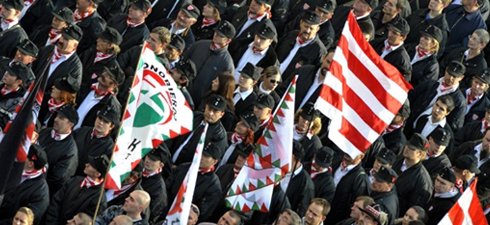Voters have been cruelly disappointed by the parties that have ruled Hungary over the last twenty years, and much of the support for the nationalist movement Jobbik (the name can be translated as "better" and "further right") is the product of a general despondency. But what does Jobbik exactly advocate and how does it go about promoting its programme?
Voters want a strong state
When you watch Jobbik videos on YouTube, the expressions most commonly used by the party faithful are "disappointment," and "I trust them." Speaking directly to camera, an extreme-right voter courageously announces that he supports the party because it has presented a programme, which is both "good and original." However, as the quote often attributed to Samuel Johnson puts it: "the part that is good is not original, and the part that is original is not good."
The alarmist noises made by left-wing intellectuals who insist that the movement is a party of Nazis and fascists are not wholly accurate. Jobbik is not a Nazi party. Gábor Vona's movement is in fact composed of three political parties. According to the latest polls, it draws significant support from regions in eastern Hungary, where voters want a strong state to take more action on everyday problems, and a hard line on law and order with a special police force to protect them from Roms.
Fed up with capitalism and EU
However, no leader of either the Hungarian Guard (a banned paramilitary organization linked to Jobbik, outlawed in late 2009) or Jobbik itself has been able to explain how public parades followed by courageous retreat can resolve any of the problems associated with the integration of Roms in Hungary. Nor have they been able to justify the need for a uniform in an organization, which purportedly limits its activities to charity work and delivering assistance to the population in times of flooding.
Jobbik's support base also includes voters inherited from other extreme-right parties, who are clearly inspired by the myth of the imminent invasion of Hungary by Israeli property developers and want nothing more to do with capitalism, the EU or government in general. Members of this subgroup are aware that their political leverage is limited, but console themselves with the thought that similarly radical parties in Europe have the capacity to influence government policy. They look to their political party to establish itself in a pedagogical role: with a number of seats in parliament, the members of Jobbik could exert pressure on the conservative opposition party Fidesz, which polls predict will be the main winner in the elections, to push it in the "right" direction.
An attachment to national-socialism
But none of the international models admired by the members of this faction, neither the Polish PiS nor the Austrian FPÖ indulge in the disgraceful diatribes against Roms and Jews and Holocaust denials that are commonly posted on official and semi-official Jobbik Internet forums. Even Ján Slota of the Slovak National Party does not dare to venture into this territory, though admittedly he has no qualms about stirring up hatred for foreigners in speeches targeting the Hungarian minority in Slovakia.
Finally, Jobbik also includes a third faction who publicly acknowledge their attachment to national-socialism. In their view, Jobbik is a somewhat soft but realistic political option. Until now, the party has succeeded in reconciling its incomprehensible admiration for Russian Prime Minister Vladimir Poutin, whose actions are often contrary to Hungarian national interests, and demands for the demolition of the Russian War Memorial in Budapest's Liberty Square.
Chicken thieves and lawlessness
In short, Jobbik's supporters are disappointed by everything except the state – even though the state has set an outstanding example in recent years. However, it is worth wondering how the state would function in the hands of a party that is dedicated to the cause of ongoing confrontation? Like any political party, Jobbik is not invulnerable to corruption. If it does succeed in obtaining a period in office, it will certainly be implicated in abuses of power that will be yet another bitter disappointment for the majority of its voters.
Chicken thieves, lawlessness, a shortage of steady jobs and an inability to implement change may be sufficient justification for rage and disappointment, but can these criteria really provide a sufficient foundation for the construction of a political strategy?
ROMANIA
Hungarian extremism knows no borders
Intensive training, military outfits, secret meetings, dress uniforms with epaulettes, Hungarian flags and revisionist slogans: the members of the Szekler Platoon do not mess around. Now that the extreme-right paramilitary organization the Hungarian Guard has been banned in Hungary, a handful of the younger members of the Szekler Hungarian speaking minority in Transylvania have decided to take up the cause. "The Szekler Platoon is the Romanian wing of the Hungarian Guard," reports Adevarul. "We are Szeklers. We are not Magyars or Romanians. Concerning the Hungarian Guard, let's just say that our groups maintain friendly relations,” says group leader Csibi Barna, age 30. For Barna, “Szekler autonomy” is a personal goal but not an end in itself. The young members of the Platoon, which makes no secret of its support for a Greater Hungary, are ardent supporters of Szekler traditions. “Both here and in Hungary, these having been losing ground to Western influences. If they disappear, we can no longer talk of the Hungarian nation”, proclaims one of its members.
Was this article useful? If so we are delighted!
It is freely available because we believe that the right to free and independent information is essential for democracy. But this right is not guaranteed forever, and independence comes at a cost. We need your support in order to continue publishing independent, multilingual news for all Europeans.
Discover our subscription offers and their exclusive benefits and become a member of our community now!












